|
|
The Asian Financial Forum in 2010, carrying the theme "Asia in the New Economic Order", concluded successfully with meaningful exchanges among financial services leaders and experts from around the world.
20 January (Wednesday) |
|
Opening Remarks
"The World Expects Asia to Rise to the Challenge"
Hong Kong Chief Executive Donald Tsang opened the Asian Financial Forum (AFF) 2010 with a call for governments to work together to see through the fragile global recovery. Read More
Mr Tsang was the first of more than 60 influential financial, business, government and regulatory officials from across Asia and around the world to speak at the Forum, held 20-21 January 2010 at the Hong Kong Convention and Exhibition Centre.
"Asia in the New Economic Order" was the theme of AFF 2010. Organised by the Hong Kong SAR Government and the Hong Kong Trade Development Council (HKTDC), the event drew more than 1,500 participants from 31 countries and regions. The delegate total set an AFF attendance record, with more than half of the senior business and government leaders coming from outside Hong Kong. The first AFF was held in September 2007 and the second in January 2009.
Delivering the Forum's Opening Remarks, Mr Tsang said Asia had been "relatively resilient in the face of the recent financial tsunami," thanks to difficult lessons learned during the economic crisis which hit the region a decade ago. "Today, the international community expects Asia to rise to the challenge and play a more prominent role in the changing economic landscape."
The Chief Executive noted that the Asian Development Bank had recently forecast 6.8 per cent growth in 2010 for the 14 emerging economies of East Asia.
Dangers Lurk
"This is better than many of us would have dared hope for this time last year," Mr Tsang noted. "However, we should not become overly optimistic. There are dangers lurking that could stall the recovery process."
"Governments around the world, including here in Asia, have spent vast sums of money in shielding their economies from the worst of the global financial crisis. Now is the time for governments to start coordinating exit strategies from these stimulus measures. A lack of coordination may lead to imbalances and financial instability that could hurt our region."
Mr Tsang said Hong Kong's fundamental strengths and vibrant economy had bolstered the city's role as a global financial centre in Asia's time zones, as well as making the city a regional asset-management centre and an offshore centre for renminbi business.
Testing Ground
"We have become a vital testing ground for the liberalisation of our nation's capital account and the regionalisation and internationalisation of the mainland currency, the renminbi," he said. "We will continue to strengthen Hong Kong's role as the testing ground for the liberalisation of the mainland currency. This includes developing other renminbi business, such as renminbi financing and promoting direct investment in Hong Kong."
The Chief Executive stressed the importance of financial integration with the mainland, a theme that was echoed by other speakers during the conference.
"Through closer financial cooperation, we aim to play an exemplary role in promoting intra-Asia financial collaboration and integration," he said. "In particular, we have the experience, expertise and the motivation to better connect our nation with partners in the region and around the world."
Mr Tsang was introduced by HKTDC Chairman Jack So, who said, "I'm sure we'll all benefit from the presentations and the diverse exchange of views that will take place over the next two days, and at the end of the Forum we'll take away fresh perspectives." |
|
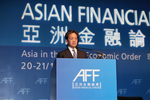
|
Mr Jack So, JP
Chairman, Hong Kong
Trade Development Council
|
|
|
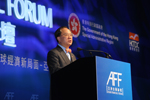
|
The Hon Donald Tsang, GBM
Chief Executive, Hong Kong Special Administrative Region
|
|
PLENARY SESSION
"The Challenges Ahead"
The Asian Financial Forum (AFF) 2010 got under way in Hong Kong on 20 January with several high-profile speakers noting Asia's growing influence on the global economy as they warned policy makers not to become complacent. Read More
Chairing the Plenary Session on the Forum's first morning was Ronald Arculli, Chairman of Hong Kong Exchanges and Clearing Ltd and a member of the Executive Council, the Hong Kong Special Administrative Region Government's top advisory body.
After being introduced by AFF emcee and well-known broadcaster Lorraine Hahn, Mr Arculli said the world's economic centre of gravity was shifting from West to East. He said that perhaps Asia fared better during the recent global downturn "in part due to lessons that we might have learned over 10 years ago" from the Asian financial crisis.
Mr Arculli said that as international markets emerge from the global crisis, some of the questions to be asked are: "What will Asia's role be? What are the opportunities? And what are the limitations or difficulties?"
The first of four distinguished keynote speakers to address the Plenary Session was Dominique Strauss-Kahn, Managing Director of the International Monetary Fund, who said Asia was leading the global economic recovery and would play a key role in the years ahead. "We certainly today have a lot to learn from Asia," he said.
Exit Strategy
Mr Strauss-Kahn said a crucial issue facing world policy makers was when to begin winding down the massive stimulus packages that staved off a depression. "Everybody came into the crisis almost at the same time. The recovery has different speeds, so different countries will exit from the crisis at different points in time." He said coordination was essential to avoid spillover of negative effects. "If you wait too long, it's a waste of resources. The longer you have a stimulus in place, the bigger the public debt, and obviously reducing the public debt will be the top priority for most countries in the coming years. But on the other hand, if you exit too early, you have a risk of a double dip."
Mr Strauss-Kahn said that 2008 was "certainly a year of humility", where confidence in markets, institutions and the status quo proved to be little more than complacency. "Now we know how fragile and interconnected we are." He said 2009 had been "a year of unity, where everybody came together to avoid something which could happen such as the Great Depression."
This year, he said, "has to be the year of transformation, not only the transformation in the balance of power between East and West, but also transformation in terms of global cooperation �V and [awareness that by] working together we can build something which is different from the kind of economy we had before. From this point of view, Asia has certainly a crucial role to play."
The Role of Credit
Liu Mingkang, Chairman of the China Banking Regulatory Commission,
said credit played a primary role in the central government's stimulus package by supporting massive infrastructure investment. "This year we will continue to control the pace and amount of the credit supply," Mr Liu said, adding that he expects it to decline to 7.5 trillion renminbi this year from an "enormous" 9.5 trillion in 2009.
"Looking ahead, our list of challenges is not short," he said. "In addition to the credit risk, market risks and operational risks are real too." The mission, he added, was "to cultivate and guide the banks to support small businesses in China."
Korn Chatikavanij, Thailand's Minister of Finance, spoke of the challenges now facing Asian governments �V the problem of capital inflows and their volatility; how to manoeuvre policies given fiscal restraints, which could be helped by leveraging private capital for infrastructure projects; and "how to secure adequate funding when banks are reluctant to lend." The latter presented the opportunity to expand regional bond markets, he said.
"We can all identify, we can all see the many challenges that lie ahead," said Mr Korn. "But I'm sure that the Asian region can work together to ensure our shared prosperity and to strengthen our role in the global economy in the coming years."
Lessons Learned
Wang Chunzheng, Executive Vice Chairman of the China Centre for International Economic Exchanges, spoke on the topic "Concerted Efforts to Secure Sustained Economic Upturn."
"We have learned a very good lesson from the Asian financial crisis," he said, noting that regional governments had worked hard to achieve fiscal balance, resulting in US$4.5 trillion in foreign reserves by the end of 2009.
Mr Wang said 2010 would be a crucial year, during which Asian governments must continue to implement effective macro measures and cooperate with one another.
"2010 is the Year of the Tiger in China," he concluded. "It's a very energetic and vibrant animal. We hope for healthy development in the economy and to leave past economic hardships behind." |
|
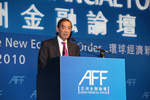
|
The Hon Ronald Arculli, GBS, JP
Chairman, Hong Kong Exchanges and Clearing Limited, and Member of the Executive Council, Hong Kong Special Administrative Region
|
|
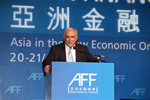
|
Dr Dominique Strauss-Kahn,
Managing Director, International Monetary Fund
|
|
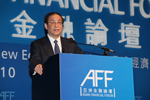
|
Professor Liu Mingkang,
Chairman, China Banking Regulatory Commission
|
|
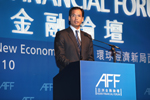
|
Mr Korn Chatikavanij,
Minister of Finance, Thailand
|
|
|
|
POLICY DIALOGUE
"Raising Asia's Voice" - Responding to the Financial Crisis - Financial Reform Impacts and Regulatory Regime Changes
Regional cooperation and a stronger Asian voice in regulation of financial institutions were prominent themes of a Policy Dialogue on 20 January at the Asian Financial Forum 2010, held in the Hong Kong Exhibition and Convention Centre.
A panel of financial officials from around Asia weighed in on how to reform regulatory regimes in the wake of the global financial crisis. Read More
"Given the more prominent role of Asian countries in the new global economic forum, I think that there should be active participation in the global financial regulatory forums by Asian countries, said Jong-Goo Yi, Standing Commissioner of South Korea's Financial Services Commission. "We need to coordinate so-called Asian views even for the regulatory agenda, and it's time to take concrete steps to enhance regional cooperation."
Mutual Benefits
Japan's Vice Minister of Finance for International Affairs, Rintaro Tamaki, echoed Mr Yi's sentiment.
"The decade after 1997-98 can be described as a decade of regional cooperation in Asia," said Mr Tamaki. "In addressing the current global crisis, however, we recognise the need to act globally as well as regionally."
"The very bitter experience through the IMF [International Monetary Fund] intervention during the crisis still preoccupies the region, and it has been energised by regional financial cooperation," he said. "The current financial crisis revealed how Asia is interconnected with other regions, and how important the growth and stability of Asia is to the rest of the world. Asia wants global stability, and the globe needs Asian power."
Chris Bowen, Australia's Minister of Financial Services, also saw the benefits of closer collaboration.
"Obviously there's some competition between various countries of the region for financial services centre status, but there's also much to be gained by increased cooperation between the countries of the region on financial services issues."
"It's in all our interests, we believe, to promote stronger cross-border flows throughout the region. Greater cooperation between regional financial centres has potential to realise significant mutual benefits. We'll all benefit directly from this cooperation."
Looking for Answers
The panel chair, Norman TL Chan, Chief Executive of the Hong Kong Monetary Authority, noted that the international community was striving to draw lessons from the crisis.
"There is at present a long list of reform agenda items being debated internationally," he said. "These include strengthening financial institutions by requiring them to hold more capital and liquidity; changing compensation practices to discourage excessive risk taking by bankers; and reforming regulatory structures to ensure more effective supervision, especially of large and complex firms that have systemic implications."
Professor KC Chan, the Hong Kong SAR Government's Secretary for Financial Services and the Treasury, said there had been a regulatory bias towards focussing more attention on banks than on the non-bank financial sector, including hedge funds, which could lead to instability.
He said that when a crisis occurs, "there is a tendency of introducing stabilising forces" for the banks, and some of those measures should be applied to non-banking financial institutions as well.
Financial innovation itself is good in terms of spreading risk, said Professor Chan, but innovative products could create problems because of "mispricing, [which] happens because there's not enough understanding about the products being created or being sold," or the financial innovators' ability to circumvent the regulators' requirements and create new problems.
Ahmad Husni Hanadzlah, Malaysia's Minister of Finance II, said his country consolidated its banking sector after the Asian financial crisis, along with introducing Islamic banking �V and as a result the banks are flush with funds.
"I hope that banks in other countries affected by the economic crisis will have their master plan and do it properly," he said, predicting that by the end of the crisis, the banking sector will be "very strong." |
|
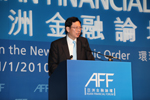
|
Mr Norman T L Chan, SBS, JP
Chief Executive, Hong Kong Monetary Authority
|
|
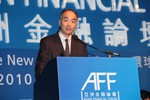
|
Mr Rintaro Tamaki
Vice Minister of Finance for International Affairs, Japan
|
|
|
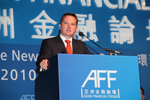
|
The Hon Chris Bowen, MP
Minister for Financial Services, Australia
|
|
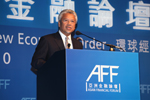
|
The Hon Dato' Seri Ahmad Husni Hanadzlah
Minister of Finance II, Malaysia
|
|
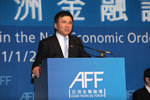
|
Professor The Hon K C Chan, SBS, JP
Secretary for Financial Services and the Treasury, Hong Kong Special Administrative Region
|
|
KEYNOTE LUNCHEON
"Let's Join Hands"- Governor Huang on Guangdong-Hong Kong Financial Cooperation
Guangdong Governor Huang Huahua was the keynote speaker at a luncheon sponsored by Deloitte Touche Tohmatsu on 20 January at the Asian Financial Forum 2010.
In his remarks, Mr Huang praised existing financial cooperation between Guangdong and Hong Kong and called for even greater collaboration among cities in the Pearl River Delta and beyond. Read More
Strength in Unity
He said Guangdong-Hong Kong financial cooperation to date, including pilot schemes to promote cross-border renminbi business and collaboration in the capital markets, had been "very conducive to overcoming all the challenges of the international financial crisis."
Governor Huang said Hong Kong, as an international financial centre, offered advantages such as its experience and its legal system, while Guangdong offered a huge market that could serve as a natural hinterland.
He also noted that the two places, besides being next-door neighbours, also benefited from CEPA, the Closer Economic Partnership Arrangement between Hong Kong and the mainland.
International Financial Centre
Governor Huang suggested moves to further develop such financial cooperation. He said the areas should develop a strategic framework for an international financial centre in the Pearl River Delta to make the region more competitive, and a deepening of various Hong Kong-Guangdong cooperation schemes under CEPA to promote internationalisation of the renminbi.
"Even though we have faced a lot of challenges and hardship, and even though we have made a lot of achievements, there is still a long way for us to go in order to see more success in financial reform and development," he said.
"So we have to continue to innovate, and we have to join hands in order to promote Guangdong-Hong Kong financial cooperation. At the same time, on this basis, I would also like to strengthen cooperation with ASEAN countries."
Good Neighbours
Governor Huang was introduced by Fred Lam, Executive Director of the Hong Kong Trade Development Council, who said, "Hong Kong couldn't ask for a better neighbour than Guangdong."
Noting that the province was a global production powerhouse and led the mainland in GDP, exports and consumer sales, Mr Lam said, "That's our kind of neighbour, our kind of business partner." |
|
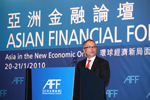
|
Mr Chris Lu,
CEO Deloitte China
|
|
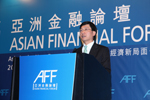
|
Mr Fred Lam, JP
Executive Director, Hong Kong Trade Development Council
|
|
|
PANEL DISCUSSION I
Investment Opportunities Galore - But How Real is the Global Recovery?
The consensus of one panel of distinguished speakers on 20 January at the Asian Financial Forum 2010 in Hong Kong was that the global economic recovery was under way, and that it was being led by Asian countries.
This would result in plenty of new investment opportunities, particularly in China and other emerging economies, but also in developed nations. However, the panellists warned, the global recovery would not be smooth, and policy makers needed to be vigilant. Read More
Emerging Markets Flex Their Muscles
Lou Jiwei, Chairman and CEO of China Investment Corporation �V the country's sovereign wealth fund �V said the worst of the global financial crisis was over, "but for things to return to the normal level is going to take a lot of time. Deleveraging is going to be a very long process."
Noting the rapid growth of the world's emerging markets, Mr Lou said that over the past 10 years, half of the world's economic growth had been created by emerging markets. They have been "the major stabiliser in the global crisis," he said, and with their growing reserves, they are increasingly looked to by developed economies for financing.
With rising middle class sectors, the emerging markets needed to shift their economic drivers from exports to domestic demand. "This is going to be a major theme in the time to come," said Mr Lou.
Stick with the Plan
Goldman Sachs Managing Director E Gerald Corrigan, former President of the Federal Reserve Bank of New York, urged policy makers to stick with the recovery agenda.
"Even though the darkest days of the crisis occurred more than a year ago," he said, "the legacy of the crisis in terms of swollen central bank balance sheets, large governmental capital interventions in both financial and non-financial institutions and virtually unprecedented budgetary deficits in the US, and elsewhere, remain."
Dr Corrigan said that over the next couple of years, regulators should systematically monitor risks to financial systems and introduce higher and more rigorous capital and liquidity standards for financial institutions.
In terms of opportunity, he identified alternate forms of energy as "a huge, huge, huge source of new investment and new employment in just about every place in the world" and said there's a pressing need for infrastructure investment, which could increasingly involve the private sector.
Sir David Brewer, Chairman of the China-Britain Business Council and former Lord Mayor of the City of London, said China offers plenty of opportunity for investors in an increasing range of sectors such as services, technology and pollution abatement.
"You don't need to be a large multinational corporation to do business in China," he said. One recent trend that Sir David noted was Chinese companies investing in Europe.
"It is vital that our markets remain open for trade and investment," he said. "Open markets will ensure that markets recover sooner."
Aftershocks
Michael Smith, CEO of Australia and New Zealand Banking Group, who themed his remarks "Economic Recovery �V Uncertainty, Volatility and Opportunity," said the global credit crisis was "a major financial earthquake" and predicted "aftershocks" would occur in the coming year.
Mr Smith said Asia's quick recovery had made it easy to be overly optimistic, but he sounded a note of caution.
"Although there has been a very strong recovery in asset markets over the past 12 months, that recovery has been much less apparent in real economic activity, which remains quite subdued at best," he said.
China, India and the other Asian economies will be the engines of global growth "for a long time to come," said Mr Smith. When people asked whether they should invest in Asia, he said he would tell them, "The question you must ask yourself is, ��Can you afford not to?' "
Mr Smith added that South American economies such as Brazil and Chile, with their "amazing natural resources" are places for investors to watch.
Stuart Pearce, Special Adviser to the Chairman and non-Executive Director of the Qatar Financial Centre Authority spoke on how financial centres in Qatar and Dubai played a key role by providing access and, with their British common law systems, giving confidence to international investors.
These centres helped channel US$63.5 billion in foreign direct investment into the Middle East in 2008, and that figure should grow "as the region attains increasing strategic significance to investors from all over the world."
"Financial centres in emerging markets provide an essential platform for attracting new investment and creating sustainable growth," Mr Pearce said.
Demand Deficit
The Panel Chair was Victor Fung, Chairman of The Li & Fung Group and Chairman of the International Chamber of Commerce.
"I think we need to watch very carefully how demand is coming back in the economy," said Mr Fung, adding, "I think there's still a demand deficit."
Until that gap is bridged, he warned, "I don't think we're on the road to a sustained recovery." Dr Fung also said high unemployment rates in the West needed to come down to reduce pressure on governments to institute protectionist measures. |
|
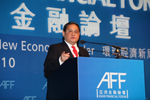
|
Dr Victor K Fung, GBS
Chairman, The Li & Fung Group, and Chairman, International Chamber of Commerce
|
|
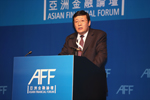
|
Mr Lou Jiwei
Chairman and Chief Executive Officer, China Investment Corporation
Topic: Global Economic Recovery and Investment Opportunities in Emerging Markets
|
|
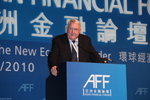
|
Dr E Gerald Corrigan
Managing Director, Goldman Sachs, and Former President, Federal Reserve Bank of New York
Topic: Global Investment Opportunities
|
|
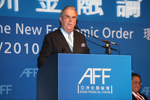
|
Alderman Sir David Brewer, CMG
Chairman, China-Britain Business Council; Former Lord Mayor of the City of London
|
|
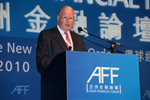
|
Mr Michael Smith, OBE, Chevalier de l'Ordre du Merite Agricole
Chief Executive Officer, Australia and New Zealand Banking Group Ltd
Topic: Economic Recovery �V Uncertainty, Volatility and Opportunity
|
|
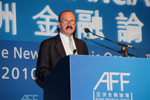
|
Mr Stuart Pearce
Special Advisor to Chairman and non-Executive Director, Qatar Financial Centre Authority
Topic: How Financial Centres can Contribute
|
|
PANEL DISCUSSION II
"Opportunity Knocks" - China in the Global Economy
China's economic importance will continue to grow, but patience and perseverance are needed on the part of financial players both inside the country and overseas.
That was the message from a panel discussion on 20 January at the Asian Financial Forum 2010 on the implication of China's domestic market for the global economy and what internationalisation of the renminbi means for the world financial order. Read More
As Panel Chair Ronnie Chan, Chairman of Hang Lung Properties, noted, "China is increasingly playing a role in global affairs, including global financial affairs."
Heavy Lifting
Stephen Roach, Chairman of Morgan Stanley Asia, opened his remarks by trying to wake the gathering from its "complacency."
"You've figured out that the West is in trouble because of the crisis and is likely to be in trouble for some time to come, so you presume that you will inherit the earth and the Asian century has arrived," he said. "I'm an optimist on Asia. I moved out here nearly three years ago because I believe in the future of this region. But it's not going to be that easy. It doesn't happen quickly. It's going to take a lot of heavy lifting for the region and for China."
Dr Roach said China was resilient and its 2009 growth had been outstanding, but that growth was funded by a record surge of bank lending under an artificial stimulus. "China did the right thing in the crisis, but this is not a long-term, sustainable outcome."
The country needed to boost private consumption, which today makes up only 35 per cent of GDP, the lowest level of all major economies, he said. "This is the opportunity for the next China."
Dr Roach, however, pointed to worrisome signs of trade friction with the US that could lead to sanctions. With high unemployment in the US and mid-term elections this year, he said, "I worry that politicians, both Republican and Democrat alike, will take out their frustrations on China."
Renminbi Internationalisation
Huang Haizhou, Managing Director and Head of the Sales & Trading Department of China International Capital Corporation, who spoke about "the implication of renminbi internationalisation on the global financial order," said renminbi internationalisation was in the interest of both China and the world as a whole.
He said that while the US dollar had depreciated significantly over the past 10 to 15 years, it was not yet time to replace it as the reserve currency.
"But its role will continue to be weakened," Dr Huang said, while the foundation has been set for internationalisation of the renminbi in three steps �V first as a unit of currency for accounting and settlement, then as an investment currency and finally as an international reserve currency.
Cao Yuanzheng, Chief Economist of BOC International, said the renminbi had been used as a settlement currency for trade for some time. "In terms of settlement, the renminbi has gone global," he said. "It's widely used in transactions."
"But we cannot just rely on trading activities," Dr Cao said. "If we want to make the renminbi further nationalised, we have to open it up on the capital level. We are not fully ready, especially since we have learned from the Asian financial crisis. We want the renminbi to be fully convertible but we also want stability. It's a very important issue to tackle."
Not for the Faint-Hearted
Louis Cheung, Executive Director and Group President of Ping An Insurance (Group) Company of China, speaking on "the China opportunity in the post-subprime era," said the prospect for internationalisation "is looking more exciting now after the crisis." It would mean a shift away from the US dollar, but he said it's not likely to happen in the next five years.
For the renminbi to be internationalised, he said, China needs to be a "net importer of goods and a net exporter of capital."
The mainland market presented a lot of opportunity, though it "is probably not for the faint-hearted," Dr Cheung concluded. "But for the persistent and hardworking industrialists, service providers and investment community, there is indeed a lot we can do in China going forward."
Tu Guangshao, Vice Mayor of Shanghai, said Hong Kong didn't need to worry that the central government was striving to make Shanghai an international financial centre.
"Shanghai and Hong Kong are both influential and they both serve the nation," Mr Tu said. By enhancing collaboration with each other in areas such as dual listings, jointly developed financial products and other cross-market activities, they can achieve synergy to help each other and the country.
"Shanghai will not replace Hong Kong," he said. "On the contrary, there will be deepened cooperation between the two places, and this will be beneficial to the reinforcement of Hong Kong's status." Mr Tu's comments came a day after Hong Kong and Shanghai signed a memorandum on financial cooperation.
����The Chinese Way''
During the question period, an audience member asked whether the renminbi could become a reserve currency in the absence of what the West considers to be democratic government and an independent judicial system.
Dr Roach answered that the mainland had been on the path of economic reform for 30 years "and has delivered economic progress that those of us who study economic development have never seen in our lifetimes." He predicted advancement of political reform in the mainland that "will be very consistent with an ascendancy of the renminbi �K but it will be done in the Chinese way and not in the way that we've become accustomed to in the West."
|
|
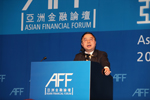
|
Mr Ronnie C Chan
Chairman, Hang Lung Properties Ltd
|
|
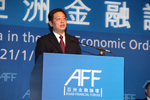
|
Mr Tu Guangshao
Vice Mayor of Shanghai
|
|
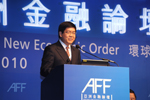
|
Dr Huang Haizhou
Managing Director and Head of Sales & Trading Department, China International Capital Corporation Ltd
Topic: The Implication of Renminbi Internationalisation on the Global Financial Order
|
|
|
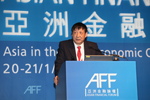
|
Dr Cao Yuanzheng
Chief Economist, BOC International
Topic: The Progress and Outlook of Renminbi Internationalisation
|
|
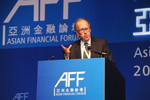
|
Dr Stephen Roach
Chairman, Morgan Stanley Asia
Topic: China's Strategic Turning Point
|
|
COCKTAIL RECEPTION
"One Region, Many Systems" - The Financial Secretary on Asia in the New Economic Order
At a cocktail reception on 20 January to wrap up the first day of the Asian Financial Forum 2010, Hong Kong SAR Financial Secretary John C Tsang spoke about the growing interconnectedness of Asian economies and the region's new global leadership role.
Mr Tsang began his remarks by taking the audience back 169 years. "It was on this very day, January 20, in 1841 that a treaty was signed ceding Hong Kong to the United Kingdom," he noted. Read More
Barren Rock
"Captain Charles Elliot of the British Royal Navy had negotiated the terms of the agreement and reported them to Lord Palmerston who was then the foreign secretary in London. Lord Palmerston was outraged, in fact, that Britain had got such a raw end of the deal. He promptly dismissed Captain Elliot from his post and famously declared that Hong Kong was, and I quote: ��A barren rock with nary a house upon it. It will never be a mart for trade.' The rest, as they say, is history. But the point is that sometimes things just don't work out as we expect."
Today, Mr Tsang said, as the world emerges from the global financial crisis, "we are considering the impact of the crisis and the shift in economic power away from Europe and the US, and towards Asia."
He said Hong Kong's success since reunification with the mainland in 1997 could hold some clues as to how Asia will rise to the challenge of its more prominent role the New Economic Order.
"The ��One Country, Two Systems' principle for our reunification is working well. We have maintained all the attributes that helped to transform the city from Lord Palmerston's ��barren rock' into a dynamic metropolis, with successful attributes such as open markets, free trade, the rule of law and low taxes. From a wider perspective, here in Asia we have ��one region, many systems.' "
Collective Strengths
Through closer integration, he said, Asian economies can build on their collective strengths, "including our diversity, our dynamism, our deep pool of talent and our competitive spirit," to spearhead the New Economic Order.
The Financial Secretary said the global economic turmoil had brought into sharp focus how regional economies are more interconnected and interdependent. "These days, we need to be accountable not only for our own economic well-being but also for that of our region. We need to put social interests ahead of self-interests, prudent risk-taking ahead of excessive profit-taking, and transparency and openness ahead of protectionism and isolationism."
"These are some of the things that have helped our city grow and thrive, and that have driven Asia's economic evolution. We don't have a crystal ball to predict the future, but our history has taught us to hope for the best, plan for the worst and expect the unexpected. So with this in mind, I have no doubt that Asia has the experience and the expertise to grasp the opportunities in the New Economic Order."
|
|
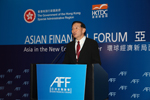
|
Mr Peter T S Wong, JP
Executive Director, The Hongkong and Shanghai Banking Corporation Limited
| English |
 |
| |
|
|
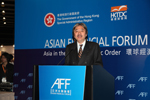
|
The Hon John C Tsang, JP
Financial Secretary, Hong Kong Special Administrative Region
| English |
 |
| |
|
|
|
|
|
BREAKFAST
"Striking a Balance" - Innovation Versus Regulation
Many blame the global crisis on a failure to adequately regulate a raft of innovative, complex financial instruments. A breakfast discussion on 21 January at the Asian Financial Forum 2010 in Hong Kong wrestled with how to strike a balance between financial innovation that creates new products and regulation to protect investors. Read More
Hot Topic
Au King-chi, the Hong Kong SAR Government's Permanent Secretary for Financial Services and the Treasury (Financial Services), described the subject as "one of the most hotly debated topics arising from the financial tsunami."
"Some said that global standards of regulation failed to keep up with financial globalisation and innovation, whereas some others believe that ample liquidity and low interest rates were indeed the major culprits, with financial innovation amplifying and accelerating the consequences," Miss Au said.
"A review in the UK specifically identifies ��financial innovation of little social value' as one of the underlying causes of the crisis," she said. "At the same time, many would still recognise the role of financial innovation in promoting growth, efficiency and market development."
In Hong Kong, for example, financial innovation had helped attract a critical mass of financial products and services, market players and liquidity.
"But innovation should not be given free rein," she warned. "The challenge for public policy-makers and market regulators is to strike a reasonable balance between these considerations in the interest of the public."
Vigilance Needed
Eddy Fong, Chairman of Hong Kong's Securities and Futures Commission, said Hong Kong had learned from the Asian financial crisis in 1998 and, fortunately, no local banks required rescuing during the past year.
There had been, however, the issue of investors losing money on the Lehman Brothers mini-bonds, so the Securities and Futures Commission was drafting a position paper on how to better protect retail investors and was looking into measures such as better disclosure of product risks and the possibility of a cooling-off period.
The commission was also working closely with the Hong Kong government on an investor education council, he said.
"Crisis can never be eliminated. It will come from time to time," Dr Fong said. "So we need to be on guard all the time." All we can hope for, he added, is that the impact of the next crisis will be less severe.
"Regulation is no substitute for discipline," he concluded. "We need all the stakeholders in the marketplace to work together �V the investors, the market participants who are preparing the products and, of course, the regulators should also play a part. This is a three-legged stool."
Safer Houses
Emil Paulis, the European Commission's Director of Financial Services Policy and Financial Markets, reminded his listeners that financial innovation helped the economy as new financial products helped raise money for everything from capital infrastructure to student loans.
Now, however, it was being blamed for the credit crisis. "Trust has been badly damaged in this crisis," he said, adding that it was essential to restore this trust in financial markets.
As a result, Mr Paulis said, "we need a more mature look at innovation in the financial sector."
"Innovation should not threaten financial stability �V first premise. Second premise: Innovation should not undermine investor protection."
Asked about the danger of overregulation, Mr Paulis likened the crisis to an earthquake. Investors would prefer to live in safer houses than risk having their homes collapse on them, he said, calling for "proportionate and intelligent regulation."
The Mainland Experience
Qi Bin, Director-General of the Research Centre of the China Securities Regulatory Commission, said China's capital market had made rapid strides in the past 20 years, but there were still a lot of problems, such as an underdeveloped bond market.
He said there was a need to improve the market's structure and efficiency, the IPO process, mergers and acquisitions activity and the debt market.
If financial reform momentum could be maintained, he said, "there's a good chance that China's economic growth will be sustainable and that the China market will be a world-class market."
Asked about innovation versus regulation, Mr Qi said, "We really need to seek a fine balance between these two. In the crisis period, there might be a tendency of overregulating, and I think we should wait for a while to reach this balance. But in China, we are in the period of further liberalising the market."
On the question of investor protection, he said, "I think both the regulator and the investor should do their due parts."
|
|
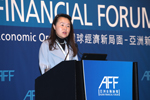
|
Ms Au King-chi, JP
Permanent Secretary for the Financial Services & the Treasury (Financial Services), The Government of the Hong Kong Special Administrative Region
|
|
|
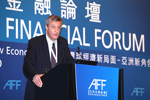
|
Mr Emil Paulis
Director, Financial Services Policy and Financial Markets, European Commission
Topic: The Situation in Europe Regarding Financial Regulatory Reforms
|
|
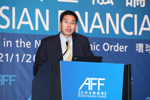
|
Mr Qi Bin
Director-General of Research Center, China Securities Regulatory Commission
|
|
PANEL DISCUSSION III
"Saving the Earth" - Carbon Finance and Energy Security
How governments, businesses and individuals can help stop climate change was the issue for a panel discussion on the environment and natural resources on 21 January during the Asian Financial Forum 2010 at the Hong Kong Convention and Exhibition Centre. Read More
Cap and Trade
Richard Sandor, Chairman and founder of the Chicago Climate Exchange, who is known as "the father of carbon trading," predicted that "the next wave of value creation will be the commoditisation of air and water," which would become the biggest commodities in the world.
The Chicago Climate Exchange already engages in a thriving trade in carbon emissions in the United States. "Carbon trading is unambiguously not the commodity of the future," he said. "It is the commodity now."
Once you price something, he said, "it catches your attention. It is possible to align financial incentives with social objectives."
The Exchange also helped set up the Tianjin Climate Exchange in China, Dr Sandor said. "I thoroughly believe that China can become the pre-eminent market for trading emissions and air and water, and substantially improve not only the quality of its life, but the quality of the planet's life."
The Vulnerable Climate
Zhang Yue, Chairman and CEO of Broad Air Conditioning, spoke on "emission rights and human rights" and the issue of climate change.
In the Western ethos, he said, "every individual has the right to have access to public resources [such as] roads and hospitals. For the planet earth, climate is an absolute and, for now, the only public resource."
Mr Zhang, who for the past decade has promoted carbon reduction and energy conservation, suggested that global carbon trading could result in developed economies that produce more carbon emissions per capita providing income to poorer countries that emit less.
He said people should take climate change into account in everything they do, for example, building smaller homes and buying smaller cars.
Asked if the mainland government was educating the public, he said, "Encouragement of consumption has been given an equal sign with patriotism, but that is against the thousands of years of values of the Chinese. Now, wastage is equivalent to patriotism. There is a contradiction there. What is the problem there? Is it the media, is it the central government, is it the people? Consumerism has been made equal to patriotism. There is something wrong. I think we should be encouraging the raising of living standards and not consumerism."
The Problem with Sanctions
Mohammad Nahavandian, President of the Iran Chamber of Commerce, Industries and Mines, said the world needed energy security, which meant that the supply of energy had to be adequate, affordable, reliable and sustainable.
Sustainable supply requires massive investment in coal, oil and gas development: an estimated US$26 trillion between 2007 and 2030, he said. But he noted that investment had declined in the past couple of years, not only in oil and gas but also venture capital investment in clean energy.
China and India would be most affected by instability and shocks in the energy market, he said.
Dr Nahavandian argued against the imposition of economic sanctions. He said they were ineffective 65 per cent of the time and their outcomes were difficult to control.
The energy market was very sensitive to shortages, he said, adding that a mere four per cent undersupply resulted in a 177 per cent price increase in global markets.
"The talk of sanctions due to some political reasons, not economic factors, is harmful to the world economy," he said. "At a time of crisis we have to think more of cooperation, dialogue, participation �V not to impose a political agenda on the economic situation of the world."
|
|
|
|
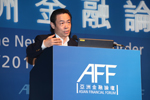
|
Mr Zhang Yue
Chairman and Chief Executive Officer, Broad Air Conditioning
Topic: Emission Rights and Human Rights
|
|
PANEL DISCUSSION IV
Getting the Private Sector Involved in Infrastructure Financing in Asia
Looking to invest your money in something different? How about Asian infrastructure projects?
The increasing scope for private-sector investment in highways, railways, ports, power capacity and other big projects was the topic of a panel discussion on infrastructure-related issues on 21 January during the Asian Financial Forum 2010 at the Hong Kong Convention and Exhibition Centre. Read More
China's Ambitious Plans
Jing Ulrich, Managing Director and Chairman of China Equities and Commodities with JP Morgan, said foreign and private-sector investors would have more opportunity to get into the mainland's big infrastructure projects.
Mrs Ulrich said vital national infrastructure was typically financed and built by governments. "But in China, the scope for foreign participation and private-sector participation is improving. We know we need trillions of yuan in the future years to achieve China's ambitious plans to build out the railway system, power grids, etcetera. I believe this will serve as a catalyst to help China develop more sophisticated financial markets, financial instruments and, as a result, attract greater foreign investment."
She also pointed to the US$8.5 trillion in untapped savings in the mainland. "A lot of this money could be lent out in the form of infrastructure loans," she said, adding that institutional investors need to buy long-term bonds, "which are actually lacking in China. So if infrastructure bonds are available in the Chinese market, they could not only finance long-term infrastructure projects, they also provide a channel for institutional investors to invest in this new vehicle."
Luring the Private Sector
Lee Jong-Wha, Chief Economist of the Asian Development Bank, said Asian countries needed to invest US$750 billion a year in infrastructure to maintain the region's competitiveness and he called for more public-private partnerships (PPP) to reach that goal.
"I believe that, to achieve our objective on sound infrastructure development, we need to increase our effort and build tangible partnerships, including with the private sector. The role of the private sector will become more and more important for regional infrastructure development. In this regard, I think an important event like the Asian Financial Forum today will be greatly beneficial to discuss these issues and attracting the interest of the private sector."
Bambang Susantono, Indonesia's Vice Minister of Transportation and Deputy Minister for Infrastructure and Regional Development, said his country needed huge investment in infrastructure such as new toll roads and revitalisation of the railway system, and that PPP was a good way to accomplish that.
Certain infrastructure projects, such as irrigation and rural development, "are not sexy for the investor," so the government must foot the bill itself. But, he said, "infrastructure which is economically feasible and financially feasible �V this is the one that we have to do our best to attract private investment to come." He said it is up to the government to establish a transparent and accountable regulatory framework to provide private investors with clarity and certainty.
Water a Key Issue
Karen Finkelston, Director for East Asia and Pacific of the International Finance Corporation, World Bank Group, said the region faced three major challenges: lowering carbon emissions, ensuring water supplies and urbanisation. One key to meeting these challenges, she said, was leveraging the private sector.
"We are looking at some financing schemes working with Chinese financial institutions to try to help industry and small business retrofit to use water more efficiently. We've done similar things with energy efficiency that have been quite successful to date in creating a new asset class for the banks and a new way of financing based on the cash-flow savings that a company would experience either from reducing their energy footprint or hopefully in the future reducing their water footprint." |
|
|
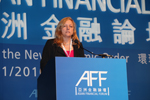
|
Ms Karin Finkelston
Director, East Asia and Pacific, International Finance Corporation, World Bank Group
|
|
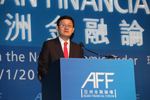
|
Dr Lee Jong-Wha
Chief Economist of Asian Development Bank
Topic: Infrastructure Financing / Viable Projects in Asia
|
|
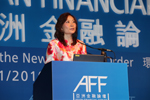
|
Mrs Jing Ulrich
Managing Director and Chairman of China Equities and Commodities, J.P. Morgan
|
|
KEYNOTE LUNCHEON
"Robust Asia" - Nouriel Roubini Speaks at the AFF
The influential economist who predicted the subprime-mortgage crisis in the United States painted a picture of weak economic recovery in the US, Europe and Japan during his speech to the Asian Financial Forum 2010.
But his outlook for China and the rest of Asia was much brighter. Read More
Nouriel Roubini, Professor of Economics at New York University's Stern School of Business and Co-founder & Chairman of Roubini Global Economics LLC, was the keynote speaker at a luncheon sponsored by Deloitte Touche Tohmatsu, the Forum's Diamond Sponsor, on 21 January at the Hong Kong Convention and Exhibition Centre.
He predicted an "anaemic recovery"in the developed world for a number of reasons, including weak labour markets and consumption, low capital spending due to a glut in capacity, and lingering damage to financial systems and credit markets.
The good news, he said, was "more robust" growth in emerging markets, especially in Asia, due in part to governments' prudent fiscal policies after the regional financial crisis of a decade ago.
China's Challenge
Professor Roubini said that while China's massive fiscal stimulus package had helped overcome the decline in export demand from the West, the nation's challenge now was to move from an export-led growth model to one of private consumption demand.
"My fear is that the strategy of China can work for a year or two, but it's going to lead to even more glut of capacity when there's already a massive amount of excess capacity,"he said. "And that's going to lead eventually to situations of overcapacity, of nonperforming loans. So the challenge of China is to really change the model of growth from net exports to private-consumption demand, but that's going to take a concerted policy change.��
Asked about a growing trend in "conspicuous consumption"in the mainland and its effect on the environment, Professor Roubini noted that overall consumption in China remained extremely low: just 36 per cent of GDP compared with 70 per cent in the US.
"There has to be more sustainable development, and I would say in this dimension it's not just for the environment that China has to become more energy efficient, but also for another reason: whenever China grows very fast, they demand more resources around the world, the price of oil energy goes up, and that's a negative in terms of trade effect on China,"he said.
"If China would become more environmentally efficient in the use, for example, of energy, they would demand less energy, oil and so on, and therefore their growth is not going to lead to such a pickup in commodity demand that it's going to crowd out the recovery. So China should become more efficient and deal with the environment, not just because of the care of the environment, but because they avoid excessive increases in commodity prices.��
He also warned of a possible slowdown in the US, Europe and Japan in the second half of this year. "I think that could be the beginning of a market correction,"he said, "because the macro economic news is going to surprise on the down side, because even the earnings news is going to surprise on the down side, because the ability of firms to cut costs is going to run its course.��
Positive Outlook for Asia
Nevertheless, he said, the world had avoided a financial meltdown. "The recovery is certainly much more robust in Asia. This is a region that, because of its own financial macro and policy fundamentals, has a much better outlook for sustained long-run economic growth, as long as some of those policy challenges I discussed are going to be faced by the policy makers."
Asked about Hong Kong's monetary policy, Professor Roubini said the Hong Kong dollar's link to the US dollar was not obviously appropriate, but neither would be a peg to the renminbi. "In my ideal world, Hong Kong would have a managed float and an independent monetary policy,"he said, "but that's not a likely policy scenario.��
After AFF 2010, Professor Roubini had praise for the event. "The AFF is a really premier forum,"he said. "The most important economic, policy and financial issues that are facing Asia in general, China and Hong Kong specifically, are being discussed, and are being discussed at the highest level.��
|
|
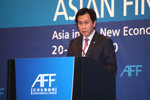
|
Mr Chaly Mah
CEO and Regional Managing Partner, Deloitte Touche Tohmatsu, Asia Pacific
Topic: Policy responses to the crisis: a perspective from Europe
|
|
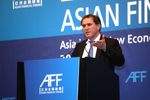
|
Professor Nouriel Roubini
Professor of Economics, NYU's Stern School of Business; and Co-founder & Chairman, Roubini Global Economics, LLC
Topic: World Economy and the Implications for Asia
|
|
CONCURRENT WORKSHOP I
"Capital Without Borders" - Greater China Financial Cooperation
In March 2009, China's State Council announced plans to make Shanghai an international financial hub by 2020. Was it the opening bell of a boxing match between the mainland city and Hong Kong?
Not according to a workshop on 21 January at the Asian Financial Forum 2010 in Hong Kong, which featured, among other speakers, officials of the stock exchanges of Hong Kong and Shanghai. It was agreed that, instead of competition, cooperation would be the way to go. Read More
The workshop, sponsored by Deloitte Touche Tohmatsu, the Forum's Diamond Sponsor, explored the integration of financial markets in Greater China (the mainland, Hong Kong and Taiwan) under the theme Greater China Financial Cooperation.
Strength in Numbers
Charles Li, the new Chief Executive of Hong Kong Exchanges and Clearing, said that if the Hong Kong and Shanghai bourses could be combined, "the Greater China market would . . . be ranked second in the world.��
"If we look at equity turnover, if we were to include Taiwan, we would be third,"he continued. "In terms of funds raised, Greater China would be the highest in the world. And if we look at IPO funds raised, the Greater China market, if combined, would definitely be number one in the world. Hong Kong is actually already first . . . The Greater China area has raised more funds through IPOs than anywhere else combined in the world.��
Although Shanghai and Hong Kong operate in different jurisdictions, with different regulations and competitive edges, Mr Li said, both markets depend on China's economy, and these differences could become complementary. "So I'm very confident about the future of Hong Kong and I'm really committed to future cooperation with Shanghai.��
Representing the Shanghai Stock Exchange was its President, Zhang Yujun, who carried on the theme of cooperation, noting that two days earlier, the two exchanges had signed an agreement to work together on regulatory issues and jointly develop financial products. He said Shanghai could learn a lot from Hong Kong.
"The better the development of the domestic market, the better growth will be achieved in Hong Kong,"Dr Zhang said. "So I believe, in future, as long as economic development is sound and stable and fast in the mainland, then the Hong Kong market will definitely have greater achievements.��
Andrew Au, Chairman of Citibank (China) Co Ltd and CEO of Citi China, identified five trends in financial integration among the mainland, Hong Kong and Taiwan: growing trade flows, growing cross-border investment flows, increasingly strong linkages in the capital market, more exchanges between financial regulatory bodies, and a growing need for banks to establish "a pan-Greater China presence.��
He said greater financial integration would provide a more favourable investment environment, stable access to capital and greater market discipline, reduce funding costs and help spread risk.
Mr Au also had advice for Hong Kong: "Its freedom and openness and well-defined regulatory framework and legal system �V those are the strengths and the competitive advantages of the Hong Kong market,"he said. "In the future, for the next decades, Hong Kong must deepen their strengths, their competitive edge �V I mean the openness of the market. Don't just depend on China.��
Cross-Straits Collaboration
Darby Liu, CEO of Core Pacific-Yamaichi International (HK) Ltd, called the recent memorandum of understanding on banking cooperation between Taiwan and the mainland "a milestone in cross-straits relations and a great leap forward.��
He said Taiwanese who were worried about being marginalised during the mainland's rapid growth would benefit from greater financial integration with the rest of Greater China, and he looked forward to the eventual establishment of a common currency.
"I'm very positive to see the future trend between the three areas of Greater China of cooperation in establishing investments,"he said.
Hong Kong-based David TC Lie, Co-founder of Rhone Capital and Chairman of Newpower Group, does business in Taiwan and sees a role for Hong Kong as a connector to help Taiwan companies tap mainland financial markets. He also sees a great opportunity for Taiwan banks in the mainland market.
"Hong Kong in the Greater China area has a significant role to play, especially for the financial market,"he said. "I believe such a role will become more and more influential in the future integration between the mainland, Taiwan and Hong Kong.��
SC Huang, CEO of Deloitte Taiwan, predicted that more mainland capital would seek investment opportunities in the Taiwan market, increasing cross-straits cooperation. ?
"There will be some sensitive issues, so Hong Kong could be used as a vehicle for this kind of investment,"he said. "And that's why we can say that Hong Kong will definitely play a very important role in the financial integration of the Greater China area.��
|
|
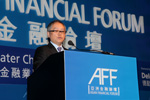
|
Mr Chris Lu
Chief Executive Officer, Deloitte China
|
|
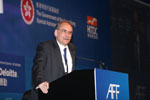
|
Dr Ken DeWoskin
Director, Deloitte China Research and Insight Centre
|
|
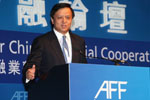
|
Mr Charles Li
Chief Executive, Hong Kong Exchanges and Clearing Ltd
|
|
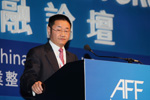
|
Dr Zhang Yujun
President, Shanghai Stock Exchange
|
|
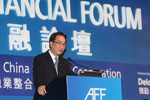
|
Mr Andrew Au
Chairman, Citibank (China) Co., Ltd.; Chief Executive Officer, Citi China
|
|
|
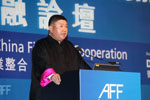
|
Mr David T C Lie, OM, JP
Co-Founder, Rhone Capital; Chairman, Newpower Group
|
|
|
CONCURRENT WORKSHOP II
"Russia Opens its Doors" - Russia's Massive Investment Opportunity and Rapid Growth
Hong Kong investors should not be overawed when looking at the scale and the scope of opportunities being presented in Russia and the Commonwealth of Independent States (CIS).
That was the message presented by Avtandil Gorgiladze the Vice President of JSC �V more commonly known as Russian Railways. Mr Gorgiladze has in recent years overseen developments that are simply staggering in size. Read More
Mr Gorgiladze made his remarks at the "Investment Opportunities in Russia and the CIS'' seminar on January 21 �V the second day of the Asian Financial Forum (AFF) 2010 held at the Hong Kong Convention and Exhibition Centre.
"All the world's greatest countries and biggest territories are not easy to manage,'' Mr Gorgiladze said. "But that of course makes the rewards even greater if your projects do succeed."
All Aboard
Mr Gorgiladze told the seminar audience about plans his company has made for the next few years as the "largest provider of transport services in Russia." In 2009, Russian Railways carried 1.1 billion passengers, said Mr Gorgiladze, noting that services required for such a market presented opportunities for 147 subsidised enterprises. "The investment needs up until 2015 are estimated to be in the vicinity of US$100 billion," he said. "And so we need partners."
Russian Railways alone accounts for 3.6 per cent of Russia's gross domestic product and handles 80 per cent of the nation's transport, said Mr Gorgiladze, and its authorized capital is about 1.54 trillion roubles (US$51.6 million).
The company puts huge importance in establishing international links, and has "major plans in the pipeline," he said, explaining that "expansion is at the head of those plans."
Risks and Rewards
Paul Brown, CEO at Jones Lang LaSalle Sallmanns, who also has a wealth of experience in guiding investments in Russia, took the workshop audience through the legalities of working in the country. He described a wealth of opportunities available to Asian investors. Mr Brown urged caution, however, saying, "These are markets that can be volatile."
That view was shared by the AFF seminar chairman Sergio Men, who serves as both chief executive officer at Eurasia Strategics and vice-chairman of the Hong Kong General Chamber of Commerce's Europe Committee. Mr Men introduced the workshop and each speaker, before he joined the audience and led a question and answer session before the seminar closed.
Eurasia Strategics was established specifically to help emerging Russian and CIS enterprises find financial backing from international sources. Mr Men said many lessons had been learned during that process, and that the possibilities were almost limitless.
He explained that he joined Eurasia Strategics in 1998 and has watched with interest as Russia's metallurgical and oil and gas markets have expanded. Mr Men began his career working for the Russian Presidential Executive Office and said that he had been increasingly working as a go-between for government organizations in China and Hong Kong and those in Russia and the CIS.
"Mining and exploration are the areas most people chose to become involved in," he said. "And for sure there is risk involved, but like any businesses you have to be confident in the partnerships you make."
Mr Men said Russia had suffered somewhat of an image problem in recent years, but regulations had been introduced to allow more safeguards for investors.
"Russia is advancing rapidly and the opportunities are increasing as time goes on as well," he said. "Events like the Asian Financial Forum help to increase awareness of what is going on in Russia and the CIS, and more communication is good for everybody.'' |
|

|
Mr Sergio Men
Chief Executive Officer, Eurasia Strategics; Vice Chairman, Europe Committee, Hong Kong General Chamber of Commerce
|
|
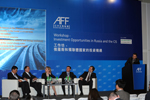
|
Mr Dmitry Barkov
Head of Corporate Finance, Sportmaster Group of Companies
|
|
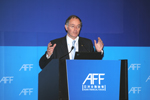
|
Mr Paul Brown
Chief Executive Officer, Jones Lang LaSalle Sallmanns
|
|
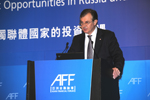
|
Mr Avtandil Gorgiladze
Vice President, JSC "Russian Railways"
|
|
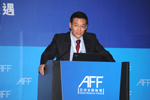
|
Mr Vladlen D Nogovitsyn
Managing Director, Arcos Hong Kong Ltd. (ALROSA Group Company)
|
|

|
Ms Alexandra Chernova
Deputy Director, Foreign Affairs, Head for Asia , St.Petersburg International Economic Forum Foundation
|
|
CONCURRENT WORKSHOP IV
"A Bigger Investor Universe" - Making Hong Kong the Islamic Gateway to China
Can Hong Kong become the Islamic world's financial portal to mainland China? That question was explored by a workshop on 21 January at the Asian Financial Forum 2010 in Hong Kong.
"Islamic finance offers great potential and vast opportunities for market players," said workshop moderator Pius Chong, Asia-Pacific Managing Director and Head of Transaction Management for HSBC. "As an international financial centre, it would be desirable for Hong Kong to develop a platform to facilitate intermediation of savings and investments between the Islamic financial communities and this region." Read More
Mr Chong is also Convenor of the Working Group on Development of Islamic Finance with the Treasury Markets Association, which organised the workshop and is helping the Hong Kong government promote Islamic finance.
Conduit to the Mainland
YC Cheng, Hong Kong's Deputy Secretary for Financial Services and the Treasury (Financial Services), said Islamic finance, which offers profit sharing instead of interest, was becoming an integral part of the global financial system as a new investment alternative, with strong growth prospects.
Mr Cheng outlined Hong Kong's competitive advantages �V including its common-law legal system and independent judiciary, the free flow of capital and information, a rich pool of professionals, robust infrastructure and low taxes. Moreover, he said, Hong Kong is the gateway to the mainland financial market.
All these credentials "would provide us with a very solid foundation to act as the two-way springboard linking the Middle East and mainland China," he said. Hong Kong could help mainland enterprises expand their global investor base by raising money from the Middle East. "For Middle East investors, we would serve as a conduit channelling their funds for investment opportunities relating to mainland China."
Mr Cheng said the government's strategies include enhancing the market infrastructure to "level the playing field" for sukuk (Islamic bonds) vis-�j-vis their conventional counterparts, which would involve reviewing tax legislation.
Sharia Compliance
Sam Kwok, Treasurer of the Airport Authority Hong Kong, noted that the authority had the same credit rating as the Hong Kong government, making it a good candidate to raise money by issuing sukuk.
He explained that Islamic finance rules prohibit the making of profit from interest but encourage the generation of profit from the performance of an underlying asset, excluding such activities as gambling, casinos and alcohol. The most common form of sukuk is Ijara structure, sometimes called a "sale and leaseback structure," which uses a special purpose vehicle to handle the underlying asset.
"Last but not least, to be sharia [Islamic law]-compliant, we need to have an opinion from the Islamic scholars saying that the structure of the sukuk is compliant with the principles of Islamic finance so that Islamic-compliant investors can buy into such an asset. That is a crucial difference between a conventional bond and a sukuk."
"The major advantage for us would be, through a sukuk structure, you can tap into a much bigger investor universe," Mr Kwok said. "Islamic or sharia-compliant investors who are not permitted to buy a conventional bond would be able to buy a sukuk, so that enlarges the universe of potential buyers of the bond substantially."
Huge Potential
Saad Rahman, Executive Director of Global Islamic Banking with Calyon, the Cr�mdit Agricole Group's corporate and investment arm (recently renamed Cr�mdit Agricole CIB), noted that there were some 1.6 billion Muslims, nearly 25 per cent of the world's population. He said Islamic finance, despite the global credit crisis, "is one of the few sectors in the financial service arena that continues to show double-digit growth."
Islamic funds currently total between US$500 billion and $1 trillion. "The Islamic potential is estimated at $4 trillion," he said. "We've got a long way to go before we reach the full potential."
Risk management, securitisation and money-market instruments are fields currently lacking in Islamic financial products, he said, and there is room for innovation despite the cautious approach of Islamic scholars.
"Islamic finance is still dependant on two markets �V Malaysia and the Gulf �V but its global expansion will bring it to a critical size that would avoid it having to rely on a limited number of countries for its publicity and its growth."
Tax Issues
Roslinda Ahmad, CIMB Islamic Bank Berhad's Associate Director and Head of Debt Market and Corporate Finance, referred to a US$550 million sukuk issue in 2008 by Khazanah Nasional Berhad, the Malaysian government's investment arm, to highlight a tax concern facing Hong Kong.
The issue, for which her bank was joint lead manager, was exchangeable for shares in the mainland's Hong Kong-listed Parkson Retail Group. Under the sukuk structure, the shares were sold by a Khazanah subsidiary to a special purpose vehicle, which then sold them to the issuing company, Paka Capital.
Khazanah applied for an exemption from stamp duty because the sale of the underlying shares was strictly to facilitate an Islamic transaction.
"I'm proud to say, thank you to the regulators in Hong Kong, that the exemption was given to Khazanah, and that saved them a few million ringgit," she said. But in the case of sukuk holders opting for shares rather than cash when they redeemed the sukuk, CIMB did not ask for an exemption "because that was a real transfer." |
|
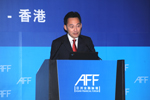
|
Mr Pius Chong
Managing Director and Head of Transaction Management, Asia-Pacific, The Hongkong and Shanghai Banking Corporation Ltd.; and Convenor, Working Group on Development of Islamic Finance, Treasury Markets Association
|
|
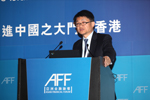
|
Mr Y C Cheng, JP
Deputy Secretary for Financial Services and the Treasury (Financial Services), Hong Kong Special Administrative Region
|
|
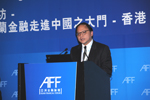
|
Mr Sam Kwok
Treasurer, Airport Authority Hong Kong
|
|
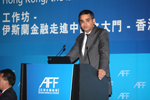
|
Mr Saad Rahman
Executive Director, Global Islamic Banking, Calyon
| PowerPoint |
 |
|
|
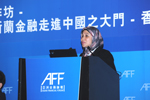
|
Ms Roslinda Ahmad
Associate Director, Head of Debt Market and Corporate Finance, CIMB Islamic |
|
CONCURRENT WORKSHOP V
"Levelling the Regulatory Maze" - Workshop on European Financial Institutions in Asia
The recent global economic turmoil has European regulators debating how to rein in financial institutions. Europe's watchdog agencies are preparing a regulatory response to the financial crisis that could come close on the heels of new rules in the United States, where the size and activities of banks are expected to be restricted.
Europe's reflections about the future were on the table at an Asian Financial Forum (AFF) workshop on 21 January entitled European Financial Institutions in Asia �V Levelling the Regulatory Maze. The main speaker was Emil Paulis, Director of Financial Services Policy and Financial Markets for the European Commission (EC). Read More
Mr Paulis said the EC was urging more member states not only to adopt the common Euro currency but also to accept stricter supervision of financial institutions. He said oversight needed to be on a European rather than a national level.
"With one approach or one voice, Europe will have the equivalent to the SEC [the Securities and Exchange Commission in the US], and Europe's will be �V and I'm sorry to say so if Americans are in this room �V better than the US," said Mr Paulis.
"We will have truly European bodies not only for banking, not only for insurance, but also for securities," added Mr Paulis, describing proposals he said would be in place by the start of 2011.
Mr Paulis said regulators were committed to creating a "level playing field" and to becoming "serious" about sanctions in the future. "It is unbelievable, it's laughable, how ridiculous the fines and sanctions are in the financial services sector," he said.
Ghosts of the Recent Past
Other workshop speakers pointed out a need to find ways to ease the pain of high-profile failures of institutions such as Lehman Brothers. Rory Gallaher, co-head of the Regulatory Committee of the Alternative Investment Management Association in Hong Kong, said regulators must pay more attention to the recovery of fund assets in the event of a company going insolvent.
"There is an enormous amount of detail to be dealt with by way of subsidiary legislation. It's inevitable that after periods of crisis there will be heightened regulations," said Mr Gallaher. But he admitted that solutions would be difficult to find. "Hopefully we're heading for a reasonable compromise. That's one where nobody is satisfied."
Mr Paulis said Europe wanted to find a new approach that was not solely focused on regulation and supervision but also pushed financial institutions to work out their own tools to resolve a crisis.
"Firms should have the mechanism at their disposal to help themselves and they should be the first line of defence. In principle, they should bear all consequences. They should prepare for consequences, and the taxpayer should not have to pay for it," said Mr Paulis.
Hedge Trimming
The EC official said hedge funds were in for much closer scrutiny under new European regulations, even though many financial experts have said the funds were not directly responsible for the global turmoil.
Mr Paulis said the changes are part of European efforts to "go further" than simply repairing problems with the regulatory framework.
"We want to create a more integrated market for hedge funds and private equity as well. Our concept and our approach is not just crisis driven. Let's be very frank: hedge funds can of course �V through certain leveraging and through the cumulative effect that we have seen in the crisis �V add to the negative spiral. They can contribute to the crisis.
"That does not mean that they are responsible for the crisis, but they can be a factor of instability at a certain point in time, and we do think that should be taken care of now. We should not wait until we have a real problem."
Burden of Proof
Speakers at the workshop also debated proposals to change regulations that would impact liability when investments go bad. Mr Paulis pointed out that during the fallout from the Lehman Brothers failure, the burden of proof was on the investors to prove that the company did anything wrong.
"This cannot be right. If I entrust an asset to you, why on earth should I have the burden of proof? You should have the burden of proof that you did everything to avoid the loss of my assets," said Mr Paulis.
"We therefore propose that the burden of prove should be inverted. Then we can talk about what should be the standard of proof," he said, adding that the "standard of proof has to be adjusted to the type of duties of the depository."
"I believe that we can't have just one simple rule of standard of proof for all of these functions. We have to be more granular and we have to specify what are then the exact obligations of the standard of proof to apply to this."
Balancing Act
Mr Gallaher said European financial institutions, including those based in Asia, were well aware that more regulation loomed and were ready to provide more information despite additional administrative burdens.
But Mr Gallaher voiced caution about proposals to "reverse" the burden of proof, saying it was a controversial approach that would dramatically increase the risk for depositories.
"That will have an impact obviously on the terms on which they will do business. It may reduce competition because many depositories will simply say they don't want to do that kind of work anymore because the margin isn't sufficient to justify the risk. I think it does have its dangers as an approach." |
|
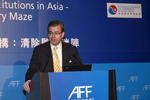
|
Mr Robert Agnew
Founder and Managing Director, Matrix Services Limited; Immediate Past President, Irish Chamber of Commerce in Hong Kong |
|
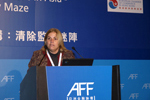
|
Mrs Maria Castillo-Fernandez
Head of Office, European Union Office of the European Commission in Hong Kong and Macao |
|
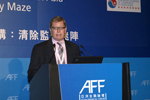
|
Mr Rory Gallaher
Partner, Hong Kong, Deacons; Co-Head, Regulatory Committee, Alternative Investment Management Association |
|
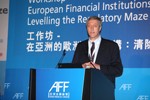
|
Mr Emil Paulis
Director, Financial Services Policy and Financial Markets, European Commission |
|
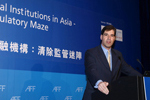
|
Mr Wilhelm Brauner
Chairman, European Chamber of Commerce, Hong Kong |
|
|
|
|

